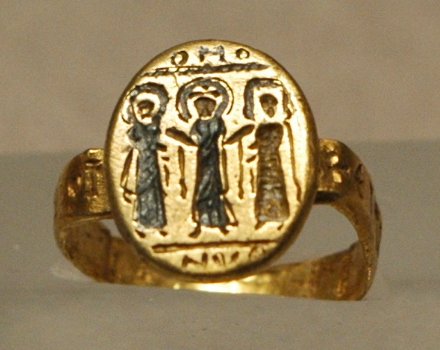Feast of the Visitation (31 May 2010)
Rm 12.9-16; Resp verses from Is 12; Lk 1. 39-56
Homily of Fr. Paul Panaretos, S.J.
Very Old and Very Current
The church celebrates this moment in the life of Jesus in the womb of Mary, a moment after learning she would be the Mother of God. Undoubtedly Mary pondered that for a good while, but time was not so important because she had replied that she would play her part in God’s providential plan for our salvation.
The church invites us to focus on this moment often, when we pray the Joyful Mysteries of the Rosary. I want to share with you something very old and very current.
 In the middle ages in Germany people praying the rosary had a custom of adding the mystery after the word, Jesus, in the Hail Mary. The example given in the history book I was reading was the scourging of Jesus. Thus: “Hail Mary...your womb Jesus, who was scourged for [me]....” I pondered that for some time, and it seemed I could appreciate the mystery more if I did that. I tried it, and I continue to do it.
In the middle ages in Germany people praying the rosary had a custom of adding the mystery after the word, Jesus, in the Hail Mary. The example given in the history book I was reading was the scourging of Jesus. Thus: “Hail Mary...your womb Jesus, who was scourged for [me]....” I pondered that for some time, and it seemed I could appreciate the mystery more if I did that. I tried it, and I continue to do it.
Sometimes a mystery requires adaptation. The Visitation is such one. This is what has become second nature to me: “Hail Mary...your womb Jesus, with whom you hastened to Elizabeth as a model of hospitality for me. Holy Mary, Mother of God....” I realized recently that interpolation is 13 words. It doesn’t seem long at all because those words allow me to enter deeply into that mystery of the rosary.
Entering the entire paschal mystery or aspects of it, plunging into the mystery shapes us more into Christian missionaries who transform the world by sincere love, mutual affection, fervent spirit, patient endurance, showing honor, rejoic[ing] in hope, persever-[ing] in prayer and excercis[ing] hospitality.
Today as we pray for service personnel, especially those who died in active duty, the Visitation reminds us that hospitality on the international scene includes exercising diplomacy in particularly patient and prudent ways precisely to avoid the deaths of women and men who are too young to die.
The Christian mystery exercised by Mary or another saint or sainted person is no past event. It has present effects in the lives and hearts of all who open themselves to the Christian mystery. Jesus always extended hospitality, especially to those others forgot or ignored. Its no wonder because he learned such conscious care in his mother’s womb. The Christian mystery is our womb of wisdom, and gives us new birth so we may transform our world.
__________________________________________________________________
Wiki-image from a page in the Bodmer Codex portraying the Visitation is in the public domain.


